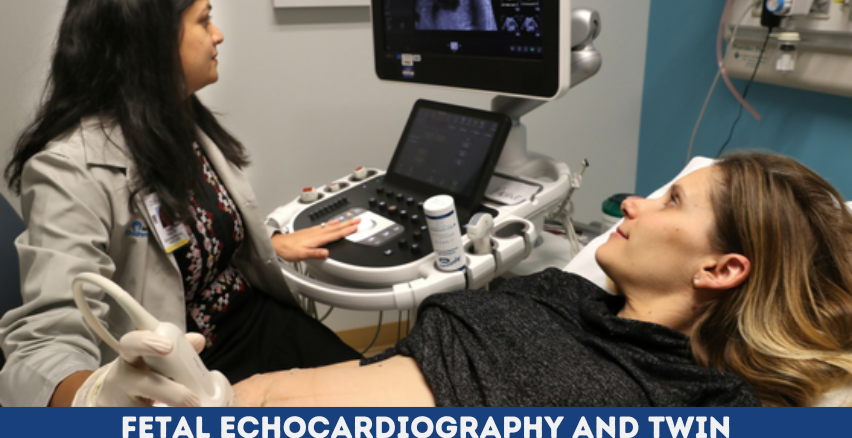Twin pregnancies come with unique joys, but they also present specific medical challenges. One important aspect of managing a twin pregnancy is the close monitoring of the babies’ health, especially their heart health. Fetal echocardiography, a specialized ultrasound focused on the fetal heart, plays a crucial role in detecting any potential heart abnormalities early on. This procedure is essential for single pregnancies, but even more so in the case of twins.
Here, we will explore, why it is important for twin pregnancies, and the specific challenges and considerations that come with it. If you are expecting twins or are a medical professional handling twin pregnancies, this guide will help you understand the benefits of fetal echocardiography.
What is Fetal Echocardiography?
Fetal echocardiography is a detailed ultrasound that examines the structure and function of a baby’s heart while still in the womb. This test is usually performed between 18 and 24 weeks of pregnancy and provides valuable information about how the fetal heart is developing. It helps detect congenital heart defects (CHDs) and other cardiovascular issues that could affect the baby’s health after birth.
In the case of twins, fetal echocardiography is particularly crucial because multiple births come with a higher risk of congenital heart abnormalities.
Why is Fetal Echocardiography Important for Twin Pregnancies?
Twins, especially identical twins (monochorionic twins who share the same placenta), have a higher risk of developing heart-related complications compared to single babies. This is because twin pregnancies often involve additional factors, such as shared blood vessels or uneven nutrient distribution between the babies.
Some common heart issues in twin pregnancies include:
- Twin-Twin Transfusion Syndrome (TTTS): A condition where one twin receives more blood flow than the other, which can cause strain on the heart of both babies.
- Congenital Heart Defects (CHDs): Twins have a slightly higher risk of being born with heart defects, especially if they are identical. Fetal echocardiography helps in early diagnosis and potential treatment planning.
- Growth Restrictions: One or both twins might not grow at the expected rate, which can affect heart development and overall health.
Early detection of these issues through fetal echocardiography allows doctors to prepare and plan for any necessary interventions during or after birth.
Challenges in Performing Fetal Echocardiography for Twins
Performing fetal echocardiography on twin pregnancies comes with unique challenges, primarily because doctors have to scan two babies in the same womb. This makes it more difficult to get clear images of the heart, especially if the babies are positioned close together or move frequently during the ultrasound. Some of the challenges include:
- Positioning: Twins often change positions during the scan, making it harder for the technician to capture clear images of each heart. It may take longer to complete the procedure compared to a single pregnancy.
- Limited Space: As twins grow, the available space in the womb becomes limited. This can make it difficult to visualize both hearts properly, especially in the later stages of pregnancy.
- Shared Placenta Complications: In monochorionic twin pregnancies (twins sharing a placenta), the risk of issues like Twin-Twin Transfusion Syndrome (TTTS) increases. Monitoring both babies’ heart health requires extra attention and sometimes repeated scans.
- Time and Expertise: Scanning twins often requires more time and advanced skills from the sonographer or doctor to ensure accurate results. Specialized centers with experience in handling twin pregnancies are essential for this procedure.
Considerations for Twin Pregnancies
If you are expecting twins, there are certain things to keep in mind when it comes to fetal echocardiography:
- Early and Regular Monitoring: Make sure to schedule your fetal echocardiography early, ideally between 18 and 24 weeks, but be open to multiple scans if necessary. Regular monitoring helps in identifying any heart-related issues early, allowing for better management.
- Choose a Specialized Center: Not all clinics are equipped to handle the complexities of twin pregnancies, especially when it comes to advanced imaging like fetal echocardiography. It’s important to choose a center with expertise in maternal-fetal medicine and fetal imaging for twins.
- Follow Medical Advice: If any abnormalities are detected, your healthcare provider will guide you on the next steps. This may involve more frequent ultrasounds, consultations with pediatric cardiologists, or even early delivery if necessary.
Fetal echocardiography is a valuable tool in ensuring the heart health of your babies during a twin pregnancy. With higher risks of heart defects and complications in twins, early and regular monitoring through this procedure can help prevent serious issues and prepare for any necessary treatments after birth. Although it can be more challenging to perform on twins due to positioning and space constraints, specialized centers and experienced medical professionals can make a huge difference in getting accurate results.
If you’re expecting twins and want the best care for your babies, consider visiting Neptune Diagnostics and Fetal Medicine Center at the Main Branch (M. G. Road) or the Fetal Medicine Center in Ghatkopar. These centers offer expert care in fetal echocardiography, ensuring that both you and your babies receive the highest standard of medical attention.

